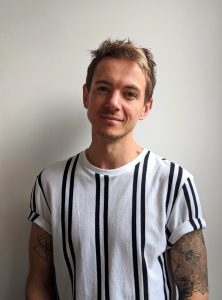Academic Spotlight: Dr Billy Haworth
Dr Billy Haworth is a lecturer and a Director in Postgraduate Teaching at HCRI. Billy teaches on the modules including ‘Disaster Management – Theory and Application’ and ‘A Critical Introduction GIS and Disasters’.
Before joining HCRI in September 2017, Billy completed a PhD in Geography, focusing on local communities mapping their own knowledge for disaster risk reduction. Billy reflects that Geography is uniquely positioned to address global challenges such as disasters as it connects places, people and the environments around them through a range of perspectives.
What attracted Billy to HCRI was the range of perspectives that can be found through the different disciplines within the institute. “I think there is a fear with some [Geography] departments of isolation and you being the one person doing that one thing,” Billy explains, reflecting that the diverse environment at HCRI allows researchers to come together with common interests and goals to work towards.
On a recent trip to Cyprus, Billy explored the interrelating nature of landscapes and urban environment through the perspective of graffiti. Billy and his colleagues chose to investigate Cyprus due to its UN buffer zone which has partitioned the country since 1974, creating a linguistic, political and economic divide.
“People maybe don’t feel like their political system is giving them a space to say what they want to say globally or locally,” reflects Billy. He explains that a dominant topic featured in all the graffiti was the idea of peace and unity. This research was presented at the Advancing Peace Geographies conference in July at Coventry University.
Since working at HCRI, Billy won an early career visiting fellowship to the Australian Centre for Culture, Environment, Society and Space (ACCESS) at the University of Wollongong. He visited the university in April to develop an upcoming project on queer experiences of disasters using participatory mapping.
Billy describes how representing minorities in mapping is vital as maps can influence policies on emergency management, and therefore, without their inclusion, LGBTIQ+ and other marginalised communities can be excluded. He highlights the importance of documenting a diverse range of queer voices in disasters. Billy says: “Media reports that cover a queer voice often use white gay males, but how does that represent a Trans woman of colour, for example?”
With his teaching, Billy tries to encourage his students to consider similar tensions which may arise in disaster management. He wants them to have a greater understanding, appreciation and recognition of diverse experiences of the world.
Billy is collaborating with Dr Lisa Ficklin from Manchester Metropolitan University to develop a toolkit to engage secondary school students in disaster management and humanitarian studies. He wants to package some of what he does at HCRI in a way that is easy for a wider audience to learn in schools within a simulated environment.
“The values I teach are the same values that underpin my research; I feel that as a lecturer and as a Western man I have some responsibility to think about others, particularly those less privileged,” he reflects. Billy doesn’t want his students to necessarily have definitive answers, but would rather they continue to ask questions and consider alternative perspectives, as these are important for identifying problems and finding better solutions.
Billy is excited to continue exploring his new projects and hopes to develop more space for community engagement work in the future.



0 Comments